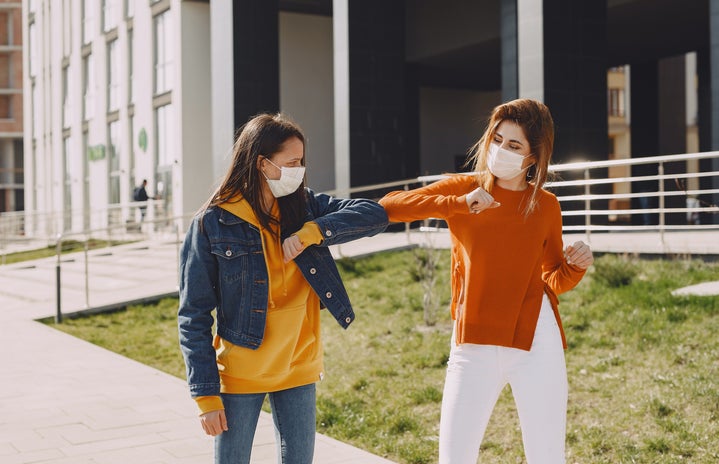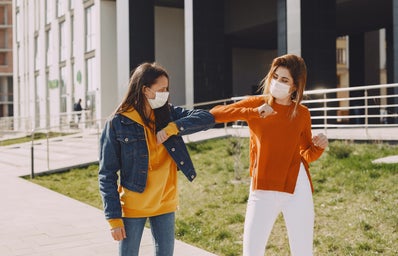I’m a huge planner. I like being in control of my surroundings. Predictability gives me comfort. So, needless to say, me and uncertainty aren’t the best of friends. If you’re like me, you’ve noticed that since COVID-19 hit, your anxiety levels have heightened in many areas of your life.
After trial and error, research, as well as through talking to people, I’ve discovered a few practices that have helped me feel more in control of my thoughts. And although this whole pandemic has proven itself to be unpredictable, there are some things you can do to give yourself some power over your life.
Before I start, I want to remind you that anxiety is a normal reaction to uncertainty. Therefore, you aren’t irrational for feeling anxious right now, your feelings are completely justified. It’s completely normal to feel like the worry is overwhelming your thoughts and expanding onto other areas in your life. Keep reading to find ways that will help you cope with this uncertainty.
Try to avoid looking at the news at all hours of the day.

In 2016, psychologist Steven Stosny coined the term ‘headline stress disorder’ during the 2016 election in the United States. Headline stress disorder refers to the fear and anxiety brought on by the ambush of intense news headlines, and this has only intensified during COVID-19.
Ways you can cope with ‘headline stress disorder’?
- When you’re feeling anxious, your thoughts rush very quickly, and the faster they rush, the less realistic they get. Anxiety often means coming up with the worst-case scenario, but reality is often not the worst-case scenario. For that reason, really think about how likely it is that your anxious thoughts will unfold like you think they will. You’ll find that the answer to this is — usually — “very unlikely”. So, let the worry pass like a wave and kindly remind yourself of reality.
- Most of us know about clickbait and COVID-19 articles are no exception. Websites still need to generate that viewer money and they’ll sometimes go to extremes to do it. You’ve probably seen the most outrageous stuff out there, like for example: “Drinking Alcohol Prevents Coronavirus”. Or my personal favourite: “Drinking Corona Beer Will Give You The Corona Virus”. Sure, some are quite funny, and we can laugh along, but others can be dangerous, so please do your research, folks! Don’t just read the headline.
(Re)connect with friends and family. Social distancing is still in full effect and you should be taking precautions whenever necessary, but virtual meetings are encouraged now more than ever before. Grab some tea, a blanket, and FaceTime your family members and friends that you haven’t talked to in a while. If this pandemic has taught us anything at all, it’s that connection matters. Don’t forget to foster your relationships, even if it can only be done virtually. Luckily, we now have the technology to communicate however we please with our loved ones, so let’s take advantage of it.
Focus on what you can control. Wash your hands and use sanitizer, wear a mask, limit in-person interactions, avoid touching your face, avoid non-essential travel, social distance, and follow recommendations from local health authorities.
That’s pretty much it… doesn’t seem like much once you jot it down, right? Just do what you have to do. Be a responsible and considerate individual, neighbour, friend, and family member.
Take care of your mind, body, and spirit.

Self-care is important every day, but now in the face of unique disruption, it is especially crucial.
Nature heals the spirit, so take some time to walk around your neighbourhood. It can make a world of difference. Pop in some earbuds, bring a book or a notepad, and soak in the sun for a little while. Just be sure to avoid crowds, keep your distance from people you encounter, and obey restrictions in your area, and you’re set.
Workout, do yoga, pilates, or go for a run/walk, just make sure you’re keeping your body active in any way you can.
Take up relaxation practices; whether that’s a 15-minute hot shower at the end of your day, or a 10-minute meditation in the morning. One of the tips that I’ve learnt during this time is to “Focus on your senses when you feel anxious”. Sensory awareness can help rewire the chemicals in your brain and ease tension. For instance, when you get anxious, focus in on an object in your room, smell a candle, feel the hot water on your back in the shower, or squeeze a stress ball.
Seek help if you need to.
There’s nothing wrong with asking for help if you think you need it. No matter where you are or what you’re going through, you never have to go through it alone. Reaching out for help doesn’t make you any less strong. You got this.
Here’s a list of resources that might help.
Remember, this too shall pass. Make sure you’re putting yourself first during this time and taking care of yourself the best way you can.



